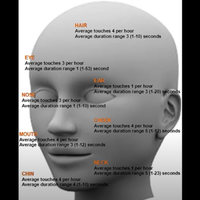Neden yüzümüze dokunmadan duramıyoruz?
Dünya Sağlık Örgütü, virüsten korunmanın en etkili üç şeklini ısrarla vurguluyor:
Evinde kal Ellerini yıka Yüzüne dokunma Çok da zor görünmüyor değil mi? Peki neden yapamıyoruz? Neden evimizde kalamıyoruz? Ellerimizi 20 saniyeden uzun süre yıkayamıyoruz? Daha da önemlisi, neden kafamıza, yüzümüze dokunmadan duramıyoruz?
Belki de bu iş söylendiği kadar basit değildir.
Michael Ryan: Odadakilere bakıyordum da son 20 dakika içerisinde kaç kişinin eliyle yüzüne dokunduğunu sayamadım…
Bunu söyleyen Dünya Sağlık Örgütü Acil Sağlık Hizmetlerinin başındaki kişiydi. Söyledikleriyle yaptıkları tutmayan tek yetkili kendisi değil.
Yetkilileri bırakın, bu konunun eğitimini alan tıp öğrencileri üzerinde yapılan küçük çaplı bir araştırma var. 26 öğrencinin tamamı, dersi dinlerken saatte ortalama 23 kez yüzüne dokunmuş. 2,5 dakikada bir ağzımıza, yanağımıza, çenemize, burnumuza, gözümüze, kafamızın muhtelif yerlerine dokunuyoruz.
Hem de daha doğmadan dokunmaya başlıyoruz. 24 ila 36 haftalık hamileler üzerinde yapılan bir araştırmada, anne karnındaki bebeklerin bile yüzlerine dokunduğu gözlemlenmiş. Anneleri stresliyse bebekler de genellikle sol elleriyle yüzlerine dokunuyormuş. Benzer başka bir araştırmada sigara içen annelerin bebeklerinin yüzüne daha çok dokunduğu kaydedilmiş.
Belli ki duygularla yüzümüze dokunma arasında bir ilişki var. Almanya'da yapılan başka bir araştırmada test çözen gençlerin elektriksel beyin aktiviteleri analiz edilmiş. Gençler testi çözerken onları rahatsız etmek için hoparlörlerden belli belirsiz sesler yayınlamışlar. Yani onların stresini arttırmışlar. Stres arttıkça deneklerin yüzlerine daha çok dokunduğu tespit edilmiş. Sonuç olarak yüze dokunmanın duyguları regüle ettiği iddiasında bulunmuşlar.
Yüzüne dokunma isteği sadece insanlara has bir davranış şekli değil. Kedilerde, köpeklerde, hatta sincaplarda bile var. Sincaplar ön pençelerini kullanarak yüzlerine dokunuyorlar. Tıpkı kediler gibi. Şimdi diyeceksiniz ki kediler yüzlerine stresten dokunmuyor, yüzlerini yıkamak için böyle bir hareket yapıyor. 1970'lerde sincaplar üzerinde yapılan bir araştırma, bu elle yüz yıkama işinin kokuyla alakalı bir davranış şekli olabileceğini iddia ediyor. Bu da bizi yüzümüze dokunma isteğimizle kokular arasında bir ilişki olup olamayacağı sorusunu sordurtuyor. Hani videonun başında demiştim ya: evinde kal, ellerini yıka, yüzüne dokunma diye. Söylemesi kolay, yapması zor bu üç davranış tümüyle birbirinden kopuk olmayabilir mi acaba? Bunları birbirine koku alma ihtiyacımız bağlıyor olabilir mi?
Evimizde kalamıyoruz, çünkü farklı kokuları toplamaya ihtiyacımız var. Ellerimizi gelişigüzel yıkıyoruz, çünkü içten içe ellerimizdeki o kokuların silinmesini istemiyoruz. Yüzümüze dokunuyoruz, çünkü dışarıdan, ellerimizle topladığımız kokuları burnumuza transfer etmemiz gerekiyor…
Bu iddiaların kanıta ihtiyacı var ve tatmin edici bir kanıt bulabildiğimi söyleyemem. Fakat 2011'den 2014'e kadar süren ve 2015 yılında yayımlanan çok ilginç bir araştırma dikkatimi çekti. Şimdi bu araştırma hakkında size hiçbir ön bilgi vermeden, deneklerin video kayıtlarını göstereceğim. Hazır mısınız?
281 kişi üzerinde yapılmış bu çalışma. Bu insanların davranışlarının ortak noktasını söylememe gerek yok herhalde. Hepsi de yüzlerine dokunuyor. Bugüne kadar insanların yüzlerine duygu durumlarını regüle etmek, streslerini azaltmak için dokunduğunu düşünüyorduk. Ancak bu görüntülerde sanki durum biraz daha farklı gibi. Bu denekler yüzlerine dokunuyormuş gibi görünüyorlar ama aslında daha çok burunlarına dokunmaya çalışıyor gibiler. Yoksa…
Yoksa asıl amacımız yüzümüze dokunmak değil de, burnumuzu karıştırmak mı? Değil tabiki. Ama bu araştırmada yüze giden elle, o eli koklama arasında bir bağlantı olduğu tespit edilmiş. “Adamın elini kokladığını nereden bileceğiz?” diye soruyorsunuz şimdi değil mi? Denekleri “sizin beyninizdeki elektriksel faaliyetleri ölçeceğiz” diye kandırıp, beyinlerindeki değil burunlarındaki hava akımını ölçen bir alet takmışlar.
Görüntünün altında bu aletin koklamayı tespit ettiği anları görüyorsunuz. Denek elini yüzüne götürmekle kalmıyor, düzenli olarak onu burnuna yaklaştırıyor ve o sırada kokluyor. Koklamayla elini yüzüne götürme arasında bir ilişki var.
Şimdi bu iş daha da ilginçleşecek. Bugünlerde hep sosyal mesafeden söz ediyoruz ya. Aslında buna fiziksel mesafe demek lazım. Biz sosyalleşmeyi fiziksel yakınlaşmayla ifade ediyoruz. Biriyle tanıştığımızda ne yaparız? Ne yapardık, eskiden? El sıkışırdık değil mi? Memnun oldum. Hatta samimi olduklarımızla öpüşürdük. Koklaşırdık. Aramızdaki fiziksel mesafeyi kaldırmaya çalışırdık. Neden? Belki de karşımızdakini daha iyi koklayabilmek için.
2015'te yayımlanan o araştırmada bunu da test etmişler. Şimdi izleyecekleriniz sizi çok şaşırtacak.
Ekranın sol üst köşesinde “Greet” yani selamlaşma yazısı var. Denekler tokalaştıktan sonra ellerini yüzüne götürüp de koklarsa “sample” yazısı çıkıyor. Bilim insanları hareketi bu şekilde ifade etmişler. El sıkıştıktan sonra “sampling” yani örnekleme yapıyoruz. Karşıdaki kişiden topladığımız örneği burnumuzla test ediyoruz.
Buradan itibaren araştırmacılar başka ilginç bir şeyi keşfetmişler. Sarışın deneğin sol eline dikkat edin. Sağ eliyle tokalaştıktan sonra sol elini kokluyor. Buradan ne sonuç çıkartabiliriz? Tokalaştığı kişiye bakın. O da bir kadın. Daha sonra erkeklerde de benzer bir davranışın olduğu fark edilmiş. Aynı cinsiyetten biriyle tokalaştıktan sonra, tokalaşmayan eli koklama davranışı. Grafikte de görülebileceği gibi bariz bir desen oluşturuyor.
Tabiki her zaman böyle değil. Örneğin bu örnekte iki kadın tokalaşıyor. Asıl merak edilen şey “sampling” hareketinin koklama olup olmadığını bulmak. Dikkat ederseniz burundaki hava akışını ölçen bir alet bağlanmış. Denek başlarda düzenli olarak soluk alıp veriyor. El sıkışılan kişi odadan çıkmak üzere arkasını döner dönmez deneğin eli yüzüne gidiyor ve koku örnekleme işi yapılıyor.
Bugünler geçtikten sonra “el sıkışma” ritüeli tarihe karışmazsa siz de böyle bir deney yapabilirsiniz. El sıkıştıktan sonra arkanıza döner gibi yapıp…
Neyse bunları karantina günleri sona erdikten sonra konuşuruz. O günler kalana kadar
Evinde kal, ellerini yıka, yüzüne dokunma ve el sıkışmadan, fiziksel olarak temas etmeden selamlaşmanın bir yolunu bul.

